The HyperTexts
The Best Quatrains Ever: Definition and Examples
The Best Quatrain Poems
Who wrote the best quatrains of all time?
But first, how do we define the term? A quatrain is a four-line stanza, often (but not always) with a rhyme scheme. A
poem may be a quatrain, or it may be composed of quatrains. Or a poem may
contain one or more quatrains along with other types of stanzas. Picking the greatest poems
of a particular form is, of course, a very subjective task and almost entirely a
matter of personal taste and fancy (so if you disagree with my choices, please
feel free to compile your own). Perhaps the most interesting thing about my
personal canon is that many of the poems are fairly recent. This leads me to
believe that the "death" of poetry has been greatly exaggerated.
compiled by Michael R. Burch
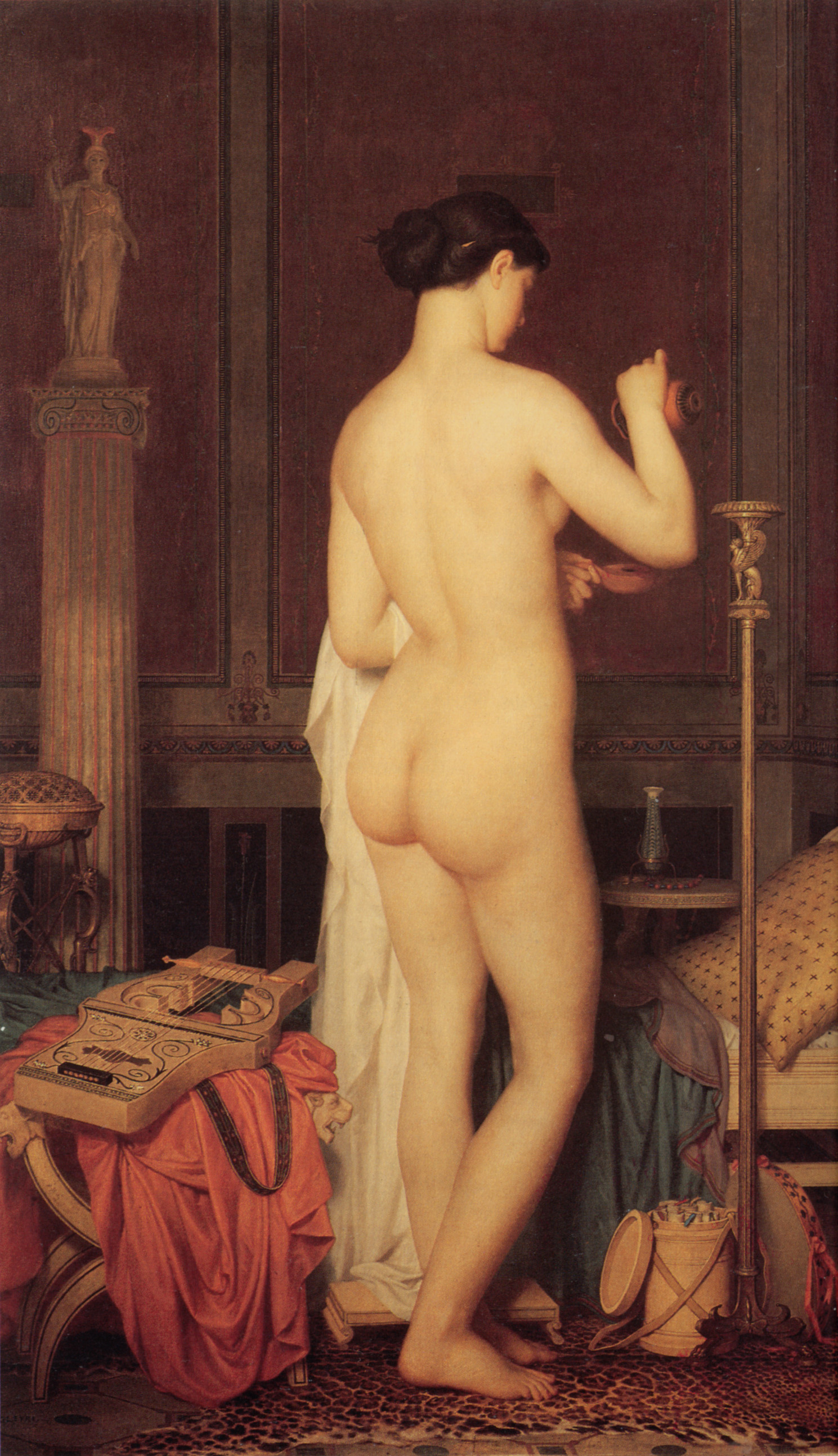
Gleyre Le Coucher de Sappho
by Marc-Charles-Gabriel Gleyre
Sappho of Lesbos is the first great female poet known to us today, and she
remains one of the very best poets of all time, regardless of gender.
Sappho, fragment 156
loose translation by Michael R. Burch
She keeps her scents
in a dressing-case.
And her sense?
In some undiscoverable place.
Sappho, fragment 16
loose translation by Michael R. Burch
Warriors on rearing chargers,
columns of infantry,
fleets of warships:
some say these are the shadowy earth's most glorious visions.
But I say—
the one I desire.
In the second poem above, Sappho may have become the earth's first "make love,
not war" poet. In any case, she was certainly far ahead of her time (and perhaps
ours).
Lyric poetry begins with (and derives its name from) short poems that were
either recited or sung to the strummings of the lyre, a harp-like instrument. The most famous of the
ancient Greek lyric poets is Sappho, who was born on the island of
Lesbos around 600 BC. The homoerotic nature
of some of her poems have given our modern words "lesbian" and "sapphic"
denotations and connotations of female homosexuality.
But Sappho was far from a one-trick pony. The first poem above is timeless and might
have been written about any modern girl or woman who acts unwisely or without
thinking first.
Here's a quatrain poem that seems just as pertinent today as the day it was written:
Refugee
by Emily Dickinson
These Strangers, in a foreign World,
Protection asked of me―
Befriend them, lest Yourself in Heaven
Be found a Refugee―
Top Ten English Language Poets Who Worked in Quatrains
Ogden Nash
Sara Teasdale
Thomas Gray
Robert Frost
Emily Dickinson
William Shakespeare (his sonnets consisted of three quatrains and a couplet)
Wallace Stevens
Hart Crane
A. E. Housman
William Blake
The Best English Poems Written in Quatrains
Stopping By Woods on a Snowy Evening, To Earthward and
Nothing Gold Can Stay by Robert Frost
Cold-Blooded Creatures and The Eagle and the Mole by Elinor Morton Wylie
Uphill
by Christina Rossetti
Dreams
by Langston Hughes
Methought I Saw
by John Milton
may i feel said he
by e. e. cummings
Bread and Music by Conrad Aiken
Requiescat by Oscar Wilde
In Memoriam A.H.H. by Alfred Tennyson
The Armadillo by Elizabeth Bishop
A Red, Red Rose
by Robert Burns
The Unreturning
by Wilfred Owen
A light exists in spring, The bustle in a house, I heard a fly buzz when I
died,
Heart we will forget him and Hope
is a thing with feathers
by Emily Dickinson
For My Funeral by A. E. Housman
The Man Whose Pharynx Was Bad by Wallace Stevens
To Brooklyn Bridge, Interior, To Emily Dickinson and
The Broken Tower by Hart Crane
Elegy Written in a Country Courtyard by Thomas Gray
Infant Sorrow, Love's
Secret, The Garden of Love,
Cradle Song, The Divine Image,
Ah! Sunflower, Jerusalem
and The Tyger by
William Blake
A Brief History of the Quatrain
A quatrain is simply a verse or stanza of four lines with an independent idea
that makes it complete in itself. We can trace quatrains back to ancient
civilizations such as Mesopotamia, China, Greece and Rome. During the dark ages
in Europe, Middle Eastern poets like Omar Khayyam popularized the quatrain,
which was called Ruba'i in Iran; hence the Rubaiyat, as
Khayyam's most famous work came to be known in the West. Edward FitzGerald's
translation of The Rubaiyat of Omar Khayyam helped popularize the
Ruba'i or Rubaiyat stanza form in the West. Here's a famous
example:
Come, fill the Cup, and in the fire of Spring
Your Winter garment of Repentance fling:
The Bird of Time has but a little way
To flutter—and the Bird is on the Wing.
American poets who adopted the Rubaiyat stanza form include Robert
Frost in "Stopping By Woods on a Snowy Evening" and Emily Dickinson in "Hope is
the thing with feathers." The most common types of quatrains in English poetry
are Ballad Stanza (ABAB rhyme scheme in ballad meter or iambic tetrameter, as in
"The Wife of Usher's Well"), Heroic or Elegiac Stanza (ABAB iambic pentameter,
as in "Elegy Written in a Country Courtyard" by Thomas Gray), Envelope Stanza
(ABBA iambic tetrameter, as in "Look Before You Leap" by W. H. Auden), Goethe
Stanza (ABAB any meter, as in poems by the great German poet), Italian Quatrain
(ABBA iambic pentameter, as in Italian sonnets), Sicilian Quatrain (ABAB iambic
pentameter, as in Italian sonnets), Hymnal Quatrain (multi-stanza with three
alternating rhymes written in iambic trimeter and iambic tetrameter, as in "A
Red, Red Rose" by Robert Burns), Redondilla (ABBA, ABAB or AABB tetrameter, as
in Spanish poems), Memoriam Stanza (ABBA iambic tetrameter, as in "In Memoriam
A.H.H." by Alfred Tennyson), and the Pantoum (it's complicated!).
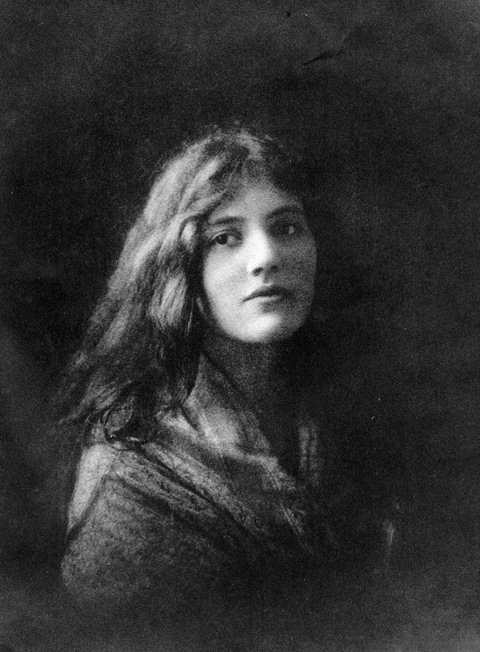
William Butler Yeats was the most famous Irish poet of all time, and his
poems of unrequited love for the beautiful and dangerous revolutionary Maud Gonne helped
make her almost as famous as he was in Ireland. The first poem below is Yeats'
loose translation of a Pierre Ronsard poem, in which Yeats imagines the love of his
life in her later years, tending a waning fire. The second poem, "The Wild Swans
at Coole" is surely one of the most beautiful poems ever written, in any
language.
The first four lines comprise a lovely quatrain.
When You Are Old
by William Butler Yeats
When you are old and grey and full of sleep,
And nodding by the fire, take down this book,
And slowly read, and dream of the soft look
Your eyes had once, and of their shadows deep;
How many loved your moments of glad grace,
And loved your beauty with love false or true,
But one man loved the pilgrim soul in you,
And loved the sorrows of your changing face;
And bending down beside the glowing bars,
Murmur, a little sadly, how Love fled
And paced upon the mountains overhead
And hid his face amid a crowd of stars.
The Wild Swans at Coole
by William Butler Yeats
The trees are in their autumn beauty,
The woodland paths are dry,
Under the October twilight the water
Mirrors a still sky ...

Elizabeth Barrett Browning was an early advocate of women's rights, and a
staunch opponent of slavery. When she married Robert Browning, theirs became the
most famous coupling in the annals of English poetry. The first four lines of
her most famous sonnet comprise a touching quatrain.
How Do I Love Thee?
by Elizabeth Barrett Browning
How do I love thee? Let me count the ways.
I love thee to the depth and breadth and height
My soul can reach, when feeling out of sight
For the ends of Being and ideal Grace. ...
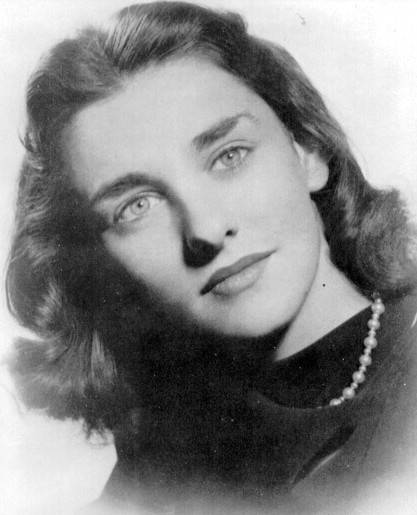
Anne Sexton was a model who became a confessional
poet, writing about intimate aspects of her life, after her doctor suggested
that she take up poetry as a form of therapy. She studied under Robert Lowell at
Boston University, where Sylvia Plath was one of her classmates. Sexton won the
Pulitzer Prize for Poetry in 1967, but later committed suicide via carbon
monoxide poisoning. Topics she covered in her poems included adultery,
masturbation, menstruation, abortion, despair and suicide. The sonnet-like poem
below is comprised of quatrains.
The Truth the Dead Know
by Anne Sexton
For my Mother, born March 1902, died March 1959
and my Father, born February 1900, died June 1959
Gone, I say and walk from church,
refusing the stiff procession to the grave,
letting the dead ride alone in the hearse.
It is June. I am tired of being brave.
We drive to the Cape. I cultivate
myself where the sun gutters from the sky,
where the sea swings in like an iron gate
and we touch. In another country people die.
My darling, the wind falls in like stones
from the whitehearted water and when we touch
we enter touch entirely. No one's alone.
Men kill for this, or for as much.
And what of the dead? They lie without shoes
in the stone boats. They are more like stone
than the sea would be if it stopped. They refuse
to be blessed, throat, eye and knucklebone.
Mary Elizabeth Frye is, perhaps, the most mysterious poet who appears on this
page, and perhaps in the annals of poetry. Her poem is two lines short of a
sonnet and may be considered to consist of three quatrains. Rather than spoiling the mystery, I
will present her poem first, then provide the details ...
Do not stand at my grave and weep
by Mary Elizabeth Frye
Do not stand at my grave and weep:
I am not there; I do not sleep.
I am a thousand winds that blow,
I am the diamond glints on snow,
I am the sun on ripened grain,
I am the gentle autumn rain.
When you awaken in the morning’s hush
I am the swift uplifting rush
Of quiet birds in circling flight.
I am the soft starshine at night.
Do not stand at my grave and cry:
I am not there; I did not die.
This consoling elegy had a
very mysterious genesis, as it was written by Mary Elizabeth Frye, a
Baltimore housewife who lacked a formal education, having been orphaned at age
three. She had never written poetry before. Frye wrote the poem on a ripped-off piece of a brown grocery bag,
in a burst of compassion for a Jewish girl who had fled the Holocaust
only to receive news that her mother had died in Germany. The girl was
weeping inconsolably because she couldn't visit her mother's grave to share her
tears of love and bereavement. When the poem was named Britain's
most popular poem in a 1996 Bookworm poll, with more than 30,000
call-in votes despite not having been one of the critics'
nominations, an unlettered orphan girl had seemingly surpassed all England's
many cultured and degreed ivory towerists in the public's estimation. Although the poem's
origin was disputed for some time (it had been attributed to Native American and other sources),
Frye's authorship was confirmed in 1998 after investigative research by Abigail
Van Buren, the newspaper columnist better known as "Dear Abby." The poem has
also been called "I Am" due to its rather biblical repetitions of the phrase.
Frye never formally published or copyrighted the poem, so we believe it is in
the public domain and can be shared, although we recommend that it not be used
for commercial purposes, since Frye never tried to profit from it herself.
Here is a printable version of
Mary Elizabeth Frye's "Do Not Stand at My Grave and Weep" which is not
copyrighted and is thus in the public domain.
Dylan Thomas's elegy to his dying father is the best villanelle in the English
language, in my opinion, and one of the most powerful and haunting poems ever
written in any language. The most common form of the villanelle in English
poetry concludes with a quatrain.
Do Not Go Gentle Into That Good Night
by Dylan Thomas
Do not go gentle into that good night,
Old age should burn and rave at close of day;
Rage, rage against the dying of the light.
Though wise men at their end know dark is right,
Because their words had forked no lightning they
Do not go gentle into that good night.
Good men, the last wave by, crying how bright
Their frail deeds might have danced in a green bay,
Rage, rage against the dying of the light.
Wild men who caught and sang the sun in flight,
And learn, too late, they grieved it on its way,
Do not go gentle into that good night.
Grave men, near death, who see with blinding sight
Blind eyes could blaze like meteors and be gay,
Rage, rage against the dying of the light.
And you, my father, there on the sad height,
Curse, bless, me now with your fierce tears, I pray.
Do not go gentle into that good night.
Rage, rage against the dying of the light.
Edward Thomas is not as well-known as some of the other poets on this page, but
"Adlestrop" was among the top ten most requested poems at Poetry Please,
so he continues to have fans. "Adlestrop" is a somewhat mysterious poem, because
nothing really happens and yet it seems extraordinarily sad.
It is composed of quatrains.
Adlestrop
by Edward Thomas
Yes. I remember Adlestrop—
The name, because one afternoon
Of heat the express-train drew up there
Unwontedly. It was late June.
The steam hissed. Someone cleared his throat.
No one left and no one came
On the bare platform. What I saw
Was Adlestrop—only the name
And willows, willow-herb, and grass,
And meadowsweet, and haycocks dry,
No whit less still and lonely fair
Than the high cloudlets in the sky.
And for that minute a blackbird sang
Close by, and round him, mistier,
Farther and farther, all the birds
Of Oxfordshire and Gloucestershire.
Percy Bysshe Shelley and Mary Wollstonecraft Shelley may have been the most notorious married
couple of their era. He was a dashing romantic poet and heretic who wrote a
tract, "The Necessity of Atheism," that got him expelled from Oxford. He also
wrote in favor of nonviolence and against monarchies,
imperialism and war. She was the daughter of one of the earliest feminist
writers of note, Mary Wollstonecraft, and the liberal philosopher William
Godwin. In 1814, at age seventeen, she
became romantically involved with Percy Shelley, who was married at the time but
threatened to commit suicide if she spurned his advances. They spent time
together in France and Switzerland; when they returned, Mary was pregnant. Percy's wife Harriet, who was also pregnant, committed suicide in 1816; Percy
and Mary married soon thereafter. The same year they spent the summer with Lord
Byron. It was at this time that Mary conceived the story that became her famous
gothic novel Frankenstein. In 1822, Percy drowned at sea at age thirty. Who knows what he would
have accomplished if he had lived longer, but he is still considered to be one
of the greatest English poets. Here is one especially lovely example of his
wonderful touch with rhythm and rhyme:
Music When Soft Voices Die (To
—)
by Percy Bysshe Shelley
Music, when soft voices die,
Vibrates in the memory—
Odours, when sweet violets sicken,
Live within the sense they quicken.
Rose leaves, when the rose is dead,
Are heaped for the belovèd's bed;
And so thy thoughts, when thou art gone,
Love itself shall slumber on.
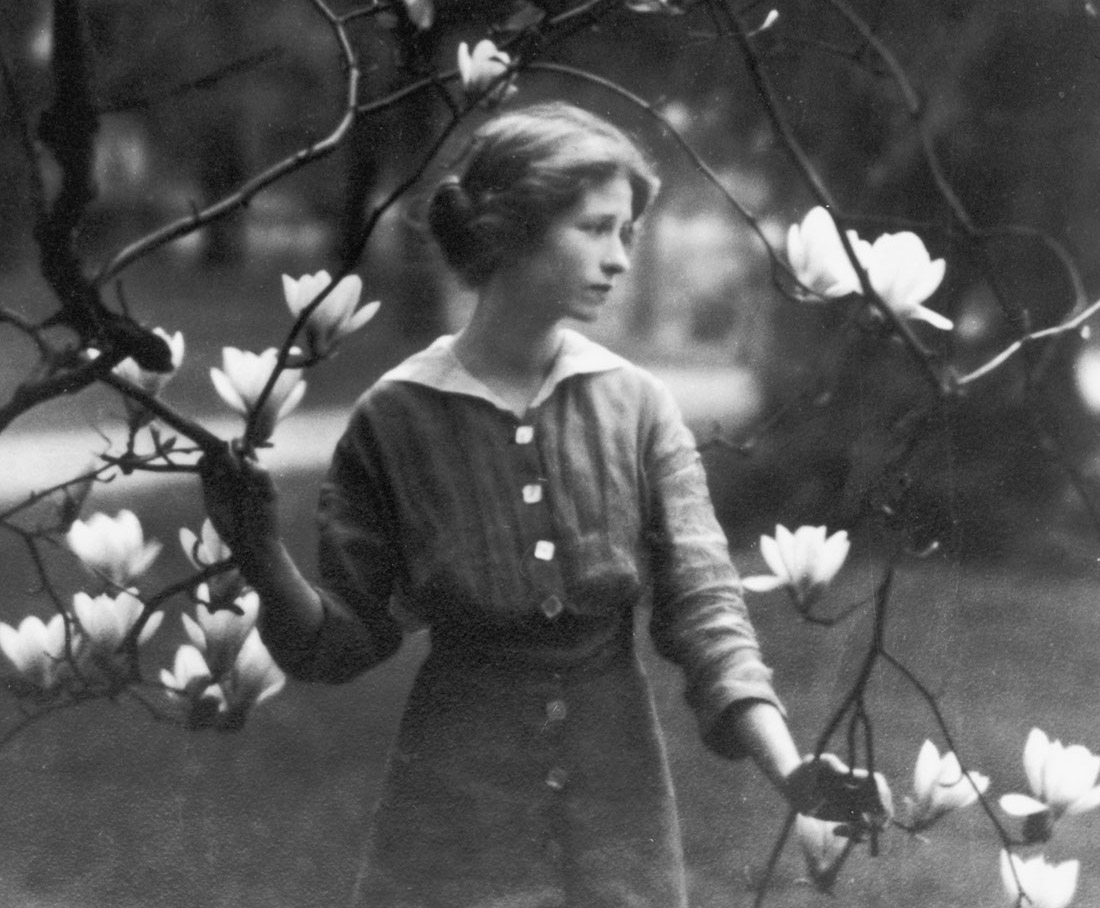
Edna St. Vincent Millay was the first woman to win a Pulitzer Prize for poetry.
She was openly bisexual and had affairs with other women and married men. When
she finally married, hers was an open marriage. Her 1920 poetry collection A
Few Figs From Thistles drew controversy for its novel exploration of female
sexuality. She was one of the earliest and strongest voices for what became
known as feminism. One of the recurring themes of her poetry was that men might
use her body, but not possess her or have any claim over her. (And perhaps that
their desire for her body gave her the upper hand in relationships.) The last
four lines of the sonnet below comprise an effective quatrain.
I, Being Born a Woman, and Distressed
by Edna St. Vincent
Millay
I, being born a woman, and distressed
By all the needs and notions of my kind,
Am urged by your propinquity to find
Your person fair, and feel a certain zest
To bear your body's weight upon my breast:
So subtly is the fume of life designed,
To clarify the pulse and cloud the mind,
And leave me once again undone, possessed.
Think not for this, however, this poor treason
Of my stout blood against my staggering brain,
I shall remember you with love, or season
My scorn with pity — let me make it plain:
I find this frenzy insufficient reason
For conversation when we meet again.
Millay is not just another penner of sonnets. Her sonnets sparkle with life and
lust amid the foreshadowing of death. She also has an interesting quality of
resolve: she seems willing to give herself to men, but not to give herself away.
If she is playing games, she is playing them knowingly, and probably understands
the rules better than her partners.
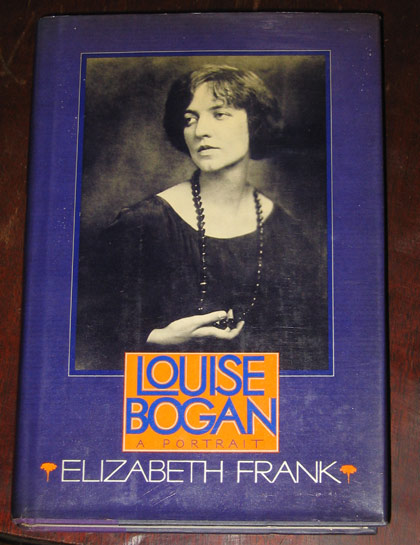
Louise Bogan is one of the best unknown or under-known poets of all time. Her
best poems make her a major poet, in my opinion. She's a poet who deserves to be
read and studied. In particular, her "After the Persian," "Juan's Song"
and "Song for the Last Act" are "must reads."
Song For The Last Act
by Louise Bogan
Now that I have your face by heart, I look
Less at its features than its darkening frame
Where quince and melon, yellow as young flame,
Lie with quilled dahlias and the shepherd's crook.
Dante Gabriel Rossetti was an English romantic poet, painter, illustrator and
translator. He was also one of the founders of the Pre-Raphaelite Brotherhood. His
art was characterized by sensuality and medieval revivalism. He frequently wrote
sonnets to accompany his works of visual art. In 1850 he met Elizabeth Siddal
(pictured above), who became his model, his passion, and eventually in 1860, his
wife. But his sister Christina Rossetti may have been the better poet.
Sudden Light
by Dante Gabriel Rossetti
I have been here before,
But when or how I cannot tell:
I know the grass beyond the door,
The sweet keen smell ...
His sister's famous "Song" below consists of four quatrains.
Song
by Christina Rossetti
When I am dead, my dearest,
Sing no sad songs for me;
Plant thou no roses at my head,
Nor shady cypress tree:
Be the green grass above me
With showers and dewdrops wet;
And if thou wilt, remember,
And if thou wilt, forget.
I shall not see the shadows,
I shall not feel the rain;
I shall not hear the nightingale
Sing on, as if in pain:
And dreaming through the twilight
That doth not rise nor set,
Haply I may remember,
And haply may forget.
William Dunbar's wonderful "Sweet Rose of Virtue" is one of my favorite
poems from the good auld days of English poetry. As I translated the poem, it
consists of three quatrains, each followed by an italicized line that concludes
the stanza.
Sweet Rose of Virtue
by William Dunbar [1460-1525]
loose translation by Michael R. Burch
Sweet rose of virtue and of gentleness,
delightful lily of youthful wantonness,
richest in bounty and in beauty clear
and in every virtue that is held most dear―
except only that you are merciless.
Into your garden, today, I followed you;
there I saw flowers of freshest hue,
both white and red, delightful to see,
and wholesome herbs, waving resplendently―
yet everywhere, no odor but bitter rue.
I fear that March with his last arctic blast
has slain my fair rose of pallid and gentle cast,
whose piteous death does my heart such pain
that, if I could, I would compose her roots again―
so comforting her bowering leaves have been.
Conrad Aiken, in his best poems, rivals Wallace Stevens and Hart Crane as
masters of modern English poetic meter. Aiken's "Bread and Music" is one of my
very favorite poems, regardless of era.
Bread and Music
by Conrad Aiken
Music I heard with you was more than music,
And bread I broke with you was more than bread;
Now that I am without you, all is desolate;
All that was once so beautiful is dead.
Your hands once touched this table and this silver,
And I have seen your fingers hold this glass.
These things do not remember you, belovèd,
And yet your touch upon them will not pass.
For it was in my heart you moved among them,
And blessed them with your hands and with your eyes;
And in my heart they will remember always,—
They knew you once, O beautiful and wise.
D. H. Lawrence is better known today for his novels than for his poetry, but "Piano"
is an immortal poem, and thus makes Lawrence an immortal poet.
Piano
by D. H. Lawrence
Softly, in the dusk, a woman is singing to me;
Taking me back down the vista of years, till I see
A child sitting under the piano, in the boom of the tingling strings
And pressing the small, poised feet of a mother who smiles as she sings.
In spite of myself, the insidious mastery of song
Betrays me back, till the heart of me weeps to belong
To the old Sunday evenings at home, with winter outside
And hymns in the cozy parlor, the tinkling piano our guide.
So now it is vain for the singer to burst into clamor
With the great black piano appassionato. The glamour
Of childish days is upon me, my manhood is cast
Down in the flood of remembrance, I weep like a child for the past.
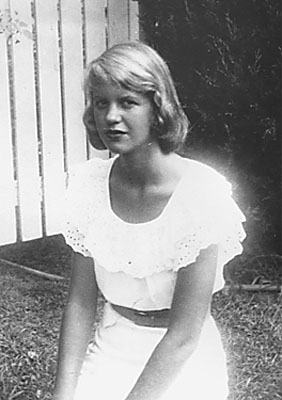
Sylvia Plath was one of the first and best of the modern confessional poets. She
won a Pulitzer Prize posthumously for her Collected Poems after
committing suicide at the age of 31, something she seemed to have been
predicting in her writing and practicing for in real life.
Winter landscape, with rocks
by Sylvia Plath
Water in the millrace, through a sluice of stone,
plunges headlong into that black pond
where, absurd and out-of-season, a single swan
floats chaste as snow, taunting the clouded mind ...
Sir Thomas Wyatt has been credited with introducing the
Petrarchan sonnet into the English language. His father, Henry Wyatt, had been one of Henry
VII's Privy Councilors, and remained a trusted adviser when Henry VIII came to
the throne in 1509. Thomas Wyatt followed his father to court. But it seems the
young poet may have fallen in love with the king’s mistress. Many legends and
conjectures suggest that an unhappily married Wyatt had a relationship with
Anne Boleyn. Their acquaintance is certain, but whether or not the two
actually shared a romantic relationship remains unknown. But in his poetry, Wyatt called
his mistress Anna, and sometimes embedded pieces of information that seem to correspond with
her life. For instance, this poem might well have been written
about the King’s claim on Anne Boleyn:
Whoso List to Hunt
by Sir Thomas Wyatt
Whoso list to hunt, I know where is an hind, [Whoever longs to hunt , I know
where there is a female deer]
But as for me, alas, I may no more.
The vain travail hath wearied me so sore,
I am of them that farthest cometh behind.
Yet may I by no means my wearied mind
Draw from the deer, but as she fleeth afore
Fainting I follow. I leave off therefore,
Since in a net I seek to hold the wind.
Who list her hunt, I put him out of doubt,
As well as I, may spend his time in vain.
And graven with diamonds in letters plain
There is written, her fair neck round about:
Noli me tangere, for Caesar's I am, [Touch me not, for I belong
to the King]
And wild for to hold, though I seem tame.
Noli me tangere means "Touch me not." According to the Bible, this is
what Jesus said to Mary Magdalene when she tried to embrace him after the
resurrection. So perhaps after her betrothal to Henry, religious vows also
entered into the picture, and left Wyatt out.
They Flee from Me
by Thomas Wyatt
They flee from me that sometime did me seek
With naked foot stalking in my chamber.
I have seen them gentle tame and meek
That now are wild and do not remember ...
In my opinion, Hart Crane's "Voyages" is the best love poem of all time, and the
second-best love poem isn't even close. Because of its length, "Voyages" appears
on the following page.
Other poems of Crane's such as "To Brooklyn Bridge" and "The Broken Tower"
also rank with
the best poems in the English language.
To Brooklyn Bridge
by Hart Crane
How many dawns, chill from his rippling rest
The seagull's wings shall dip and pivot him,
Shedding white rings of tumult, building high
Over the chained bay waters Liberty—
Then, with inviolate curve, forsake our eyes
As apparitional as sails that cross
Some page of figures to be filed away;
—Till elevators drop us from our day ...
I think of cinemas, panoramic sleights
With multitudes bent toward some flashing scene
Never disclosed, but hastened to again,
Foretold to other eyes on the same screen;
And Thee, across the harbor, silver-paced
As though the sun took step of thee, yet left
Some motion ever unspent in thy stride,—
Implicitly thy freedom staying thee!
Out of some subway scuttle, cell or loft
A bedlamite speeds to thy parapets,
Tilting there momently, shrill shirt ballooning,
A jest falls from the speechless caravan.
Down Wall, from girder into street noon leaks,
A rip-tooth of the sky's acetylene;
All afternoon the cloud-flown derricks turn ...
Thy cables breathe the North Atlantic still.
And obscure as that heaven of the Jews,
Thy guerdon ... Accolade thou dost bestow
Of anonymity time cannot raise:
Vibrant reprieve and pardon thou dost show.
O harp and altar, of the fury fused,
(How could mere toil align thy choiring strings!)
Terrific threshold of the prophet's pledge,
Prayer of pariah, and the lover's cry,—
Again the traffic lights that skim thy swift
Unfractioned idiom, immaculate sigh of stars,
Beading thy path—condense eternity:
And we have seen night lifted in thine arms.
Under thy shadow by the piers I waited;
Only in darkness is thy shadow clear.
The City's fiery parcels all undone,
Already snow submerges an iron year ...
O Sleepless as the river under thee,
Vaulting the sea, the prairies' dreaming sod,
Unto us lowliest sometime sweep, descend
And of the curveship lend a myth to God.
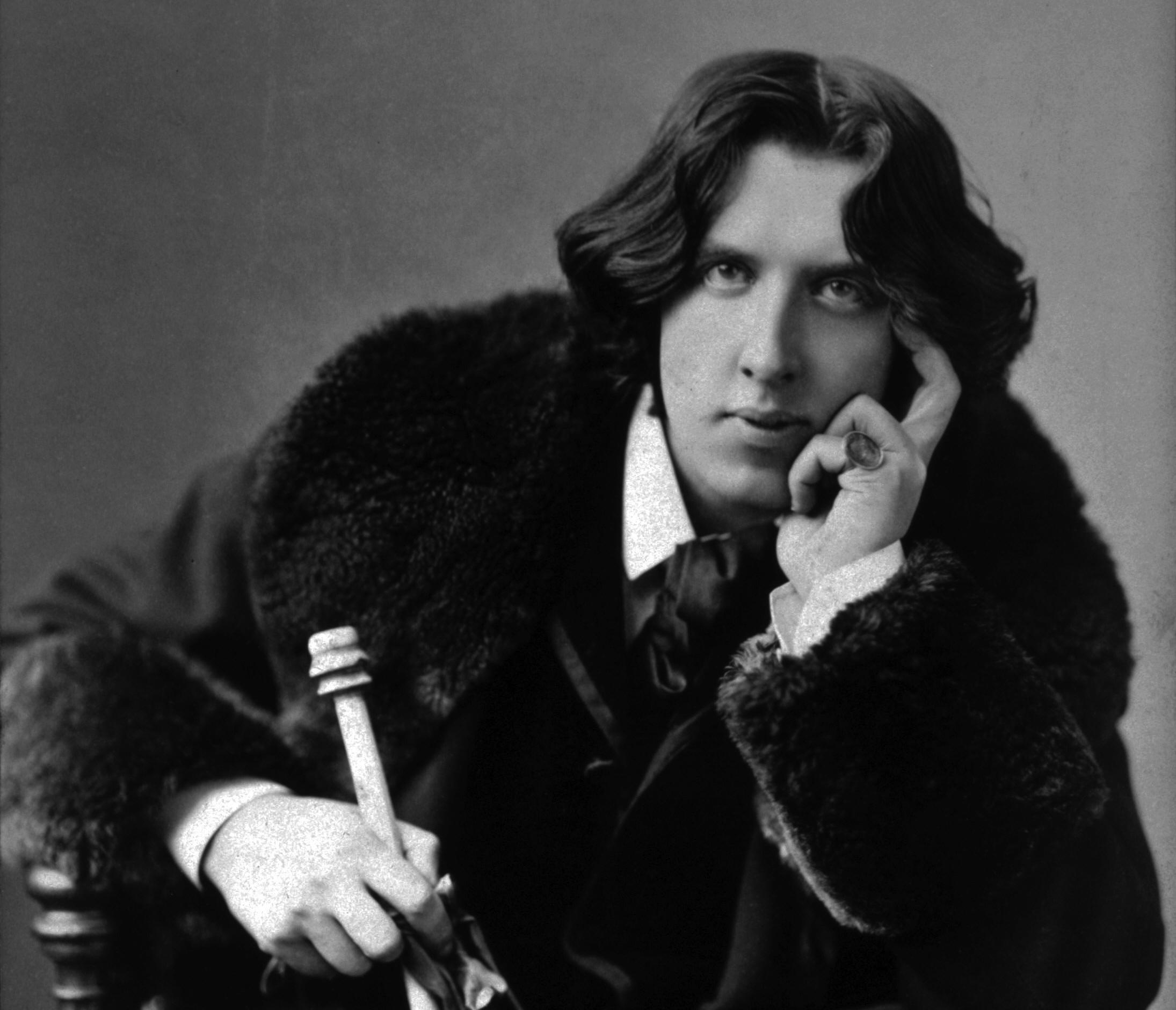
Oscar Wilde may be the most notorious "bad boy" in the annals of poetry and
literature. He was flamboyantly gay at a time when polite society was prim,
proper and violently homophobic. As a result, he was sentenced to hard labor at
Reading Gaol and died soon after his release. Wilde is justly famous today for
his disdain for "respectability" and dull and dulling conformity, as his witty
epigrams prove. But the lovely, wonderfully moving poem below proves that he was
also a true poet.
Requiescat
by Oscar Wilde
Tread lightly, she is near
Under the snow,
Speak gently, she can hear
The daisies grow.
All her bright golden hair
Tarnished with rust,
She that was young and fair
Fallen to dust.
Lily-like, white as snow,
She hardly knew
She was a woman, so
Sweetly she grew.
Coffin-board, heavy stone,
Lie on her breast,
I vex my heart alone,
She is at rest.
Peace, Peace, she cannot hear
Lyre or sonnet,
All my life's buried here,
Heap earth upon it.
Related pages:
The Most Beautiful Sonnets in the English Language,
The Most Beautiful Lines in the English Language,
The Best Anglo-Saxon Riddles and Kennings;
Ancient Greek Epigrams and Epitaphs,
The Best Poems Ever Written,
The Best Love Poems,
The Best Erotic Poems,
The Best Love Songs Ever,
The Best Urdu Love Poetry,
The Best Poetry Translations,
The Best Poems for Kids,
The Best Nonsense Verse,
The Best Rondels and Roundels,
The Best American Poetry,
The Best Story Poems,
The Best Narrative Poems,
The Best Epic Poems,
The Best Thanksgiving Poems,
The Greatest Movies of All Time
The HyperTexts







